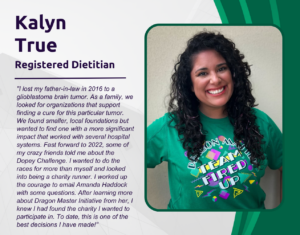*Disclaimer: These blogs are for informational purposes only and should not be construed as medical advice. Please consult a physician if you have any pre diagnosed health conditions. Remember, nothing new on race day, please try out all nutrition and hydration recommendations while training. This is generalized nutrition advice, please use the dietitian question box for individualized nutrition guidance*
Happy training everyone! We briefly covered eating pre race, I wanted to expand on that a little more with races coming up! Big thing to remember, fuel is your tool!

Anyone can fall victim to under-fueling, whether you are a new racer or an experienced racer. It is especially easy when you are traveling to a race or going to the parks days leading into the race. When you are preparing to race you want to make sure you are trying to gradually build up your energy stores by steadily increasing your carbohydrate intake over 3 days leading into the race by as little as ~200-300calories extra from carbohydrate sources can make a big difference. You could also think about this as half of your plate coming from carbohydrates from grains and/or starchy vegetables, a quarter of the plate lean protein, a quarter of the plate with non-starchy vegetables.
As you are reading through the following tips, remember every runner is different! Some trial and error may be needed to figure out what works best for you. As an example, some people get into carbohydrate cycling, which may be a topic for a future blog, but for most its easier to make this gradual intake over ~3 days pre-race instead of trying to eat a large, heavy meal the night before a race. Eating a large meal can lead to bloating and GI discomfort such as stomach cramping or even diarrhea the morning of the race.
You also want to make sure you are increasing all forms of carbohydrate in all meals of the day 2-3 days leading into race weekend, such as starchy vegetables, fruits, complex and simple starches, not just popular go-to’s like pasta only at dinner time to replenish glycogen stores. What is glycogen you may ask? It is the main fuel source for your body that is a stored amount of sugar, otherwise known as glucose, that gets stored in your liver and your muscle tissues. When you start exercising your body pulls from these stores of energy to fuel your activity. This is why it is important to have a plan in place for the several days leading into the race weekend. Ask yourself the following questions and try to plan accordingly:
- Am I going to spend a full or partial day at a parks before my race or races?
- Am I going to spend a full or partial day at a parks after my race or races?
- Have I signed up to do just one or multiple races this weekend?
- Do I have any other activities planned for this weekend that would require me to exert extra energy?
- Am I going to just eat what is at the parks or am I going to plan to bring my own snacks with me?
At the parks people are usually walking at least several miles per day, this can deplete glycogen stores before you even get to the races if you aren’t fueling properly. In order to decrease or minimize fatigue while racing, you want to make sure you are eating high quality meals these several days pre-race, not skipping meals, and making sure to review the below guidelines:
Foods to incorporate:
- Rice
- Pasta
- Quinoa
- Root vegetables (potatoes, beets, turnips, parsnips, sweet potatoes)
- Oats
- Fruit
Foods to avoid:
- Fried or greasy foods, foods high in saturated fats – fats can slow down the digestion process
obacon, sausage, chorizo, etc. - Spicy foods
- Coffee – for some people this is important to avoid the morning or several days prior as it is not only a diuretic but can increase motility and increase bowel activity
- For some people dairy can cause bloating so you may need to be mindful of milks, cheeses, yogurts the 2-3 days leading into the race
- Your last “big” meal, if you are someone that tends to eat large dinners, should be no closer than ~2 nights pre-race
- You also want to be aware of high fiber intake the 12-24hrs pre-race
- Watch out for sugar alcohols like: xylitol, erythritol, sorbitol, maltitol, and mannitol that can be found in sugar free gums, desserts, or candies. Some people are sensitive and in large amounts can cause a fluid shift in the gut which may lead to diarrhea.
If you are planning to do the parks 2-3 days pre-race it is important to look at food options that may be available. Most places that have sit down meals will have healthy options available. Quick service may not have as many options, so when you are working on planning out park days check out the Disney app or website ahead of time and see what quick service options may fit the aforementioned criteria. On my quick search I found some options at the following places:
Magic Kingdom:
- Columbia Harbour House
- Cosmic Ray’s Starlight Café
- Pecos Bill Tall Tale Inn and Café
- Sleepy Hollow
Epcot:
- Connections Eatery
- Regal Eagle Smokehouse
Hollywood Studios:
- ABC Commissary
- Backlot Express Docking Bay 7 Food and Cargo
- Fairfax Fare
Animal Kingdom:
- Flame Tree Barbeque
- Satu’li Canteen
Day before the race:
The day before a race you still want to create a balanced meal: breakfast, snacks, and lunch should include carbohydrates, protein, and some vegetables. Dinner you want to be mindful of high fiber vegetables and high fat foods. Look for meals that may include potatoes, quinoa, rice, grains, and fruit. Protein is important to keep a little bit higher as well. In order to recover post- race, you want to have at least 20-30g of protein for females and 30-40g for males for this pre-race dinner. Proteins can include any source of lean meat, poultry, fish, seafood, eggs, tofu, or legumes.
What time does one eat “dinner” when you wake up at 2-3am the next day? This will be a personal preference for many people and again something that could be practiced if you are planning any simulation weekends, but a safe start would be 4:00-5:00pm, since some people try to get to sleep close to 7:00-9:00pm the night of a race. Any time you are eating dinner racing or not, you would ideally give your body at least 2-3hrs to break down and digest the meal to prevent any kind of risk for reflux or regurgitation or waking up with bloating. It may be important to start booking meals at least a month out or longer if you have a special sit down restaurant in mind to accommodate this earlier eating time. If your desired place doesn’t have availability, check out your resort for cafeteria style options or Disney Springs has a wide variety of restaurant options available as well! When in doubt you could always check out local sandwich shops, places like Chipotle, Starbucks, or similar places to what you may eat at home. Here are some examples of carbohydrate rich meals you could work on adapting:
- Pasta with red sauce and a lean protein
- Quinoa or rice bowl with a lean protein, potatoes or sweet potatoes, and tomato, onions, bell peppers
- Pancakes with fruit and a hard boiled egg
- Stir fry with a lean protein, vegetables, and rice
- Turkey or salmon burger on a bun with roasted potatoes and fruit
We have previously covered hydration, but just to note, you want to be mindful of staying hydrated pre-race. Bring a water bottle with you to the parks or any other activity you may be planning. Try to sip water or liquids all day instead of trying to chug glasses of water/fluids at or after dinner time as that may keep you up all night going to the bathroom. Be mindful of alcohol and caffeine the day before races as well.
Keep in mind, you can always have the perfect plan in place, but anxiety, stress, and excitement can affect how your body responds to eating. Did you know that stress can alter the motility (movement) of your gut and also have an effect on gastric emptying? It depends on the person but it could either speed up or slow down this movement and emptying effect. If you think or know you struggle with pre-race jitters its even more important to test these strategies out on long run or simulation weekends!
